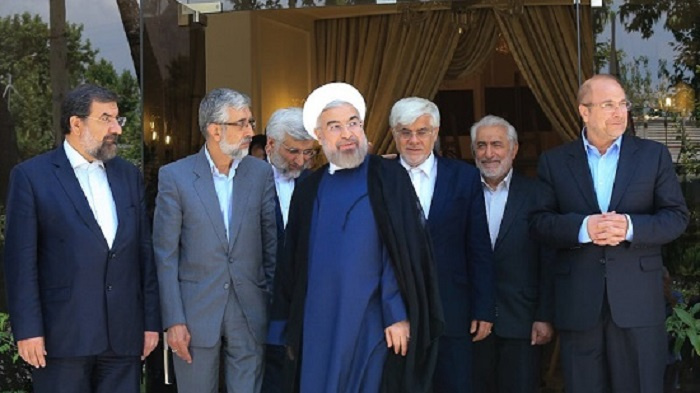Will Rouhani Be Iran’s First Single-Term President?

Since Hassan Rouhani’s surprise election to presidency in June 2013, the Principlist camp has been floating the idea of turning him into the first single-term president of the Islamic Republic. This is not the first time, however, that the opposition campaigns to oust the incumbent president from his seat in Pasteur.
Mahmoud Ahmadinejad, who also like Rouhani was elected as the highest executive of the country in 2005 faced a strong wave of propaganda from a broad camp that included Reformists and senior figures of the Islamic Republic old guard including Akbar Hashemi Rafsanjani and former speaker of the parliament Akbar Nategh Nouri. The anti-Ahmadinejad propaganda intensified during the 2009 presidential campaigns, and culminated in the post-election protests that continued powerfully for eight months afterwards.
Economy and nuclear program have been at the heart of campaigns against Rouhani and Ahmadinejad, though they have two diametrically opposed directions. While it was Ahmadinejad’s maverick nuclear policy and harmful economic policies, particularly hitherto controlled inflation, which had worried the Reformists and moderates of the establishment, Rouhani has been slammed for his assumedly ‘appeasing’ nuclear policy vis-a-vis the world powers which led to the historical Joint Comprehensive Plan of Action, and his efforts to curb untamable inflation which have now led to what many call the deepest economic recession Iran has witnessed since the 1979 revolution.
Rouhani’s victory by a narrow margin of less than 1 percent in the 2013 presidential elections, and his lack of a distinct social base has convinced Principlist and hardliner rivals that dislodging him from the presidential palace in Pasteur will not be a hard task. In this way, however unlikely, they might eat the humble pie and reunite with former president Mahmoud Ahmadinejad, at the moment the only charismatic figure who can attract public vote against Hassan Rouhani.
On Monday, April 4, the moderate pro-Rouhani website of Asr-e Iran published an analysis on the four challenges that may endanger Rouhani’s election to his second term. According to Jafar Mohammadi, author of the article, the painstaking process of reconstructing Iran’s economy after years of sanction, the disillusionment with the expected quick recovery after removal of sanctions will be the 67-year old president’s primary challenge. “The problem for Rouhani is that there are no ‘miracles’ in economy and the adverse impact of sanctions and mismanagement cannot be removed in short-term” Mohammadi wrote.
“Populist” propaganda, including a hike in cash handouts to the public, already a much-detested liability by the cash-strapped administration of Rouhani, by the opposition camp will be another hardship for the president, as will be the heavy psychological war against him which will reach its height in the upcoming months before the presidential election. In the meantime, More and more wrenches will be thrown at the moderate president’s work as the election day comes closer by powerful institutions dissatisfied with Rouhani’s policies.
“Rouhani’s popularity remains unchanged and there are no evidence to show disillusionment among the 19 million who voted for him in 2013” said the Reformist analyst Sadegh Zibakalam on Wednesday, denying snowballing claims by the hardliners that Rouhani has lost his supporter base. However, Zibakalam added that “[t]he only dark cloud in the sky is recession. Many private and state-owned warehouses are full of goods with no customers. A young population of more than 8 million is struggling with unemployment and there are no signs of economic leap in [the new Iranian year of] 1395”.
It is this dark cloud that the Principlists have capitalized on, portraying Rouhani’s administration as oblivious to the hardships of the public, sacrificing economy only to achieve a nuclear deal with ‘untrustworthy’ global powers. With Ahmadinejad’s return to the public scene and his trademark ‘provincial tours’ around the country, it is predictable that Hassan Rouhani will have hard time in extending his tenure in Pasteur.
IRD/66

